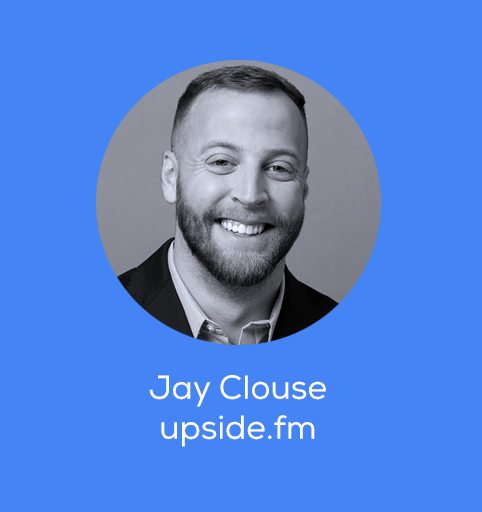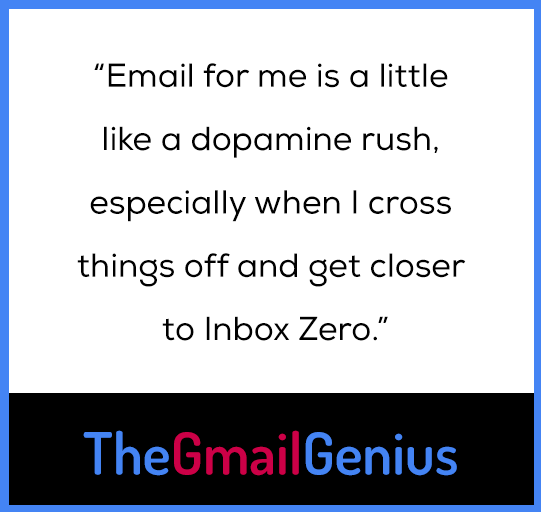How I Email: Jay Clouse, Founder, Unreal Collective
Email is a non-negotiable part of everyday life. For some, it’s an unruly time suck, but enlightened email users have systems to ensure they’re not a slave to the inbox. We’re asking smart thinkers to give us a peek inside their inboxes, share tips, ideas, gripes, and everything in between.
Jay Clouse is the founder of Unreal Collective, co-host of the upside podcast, and an author for Linkedin Learning / Lynda.com. An entrepreneurial whiz with a passion for product management, he shares his tips and guidance to startups via his weekly Work In Progress newsletter. Jay shares how email can be better with a product management mindset.
 What does your daily email routine look like?
What does your daily email routine look like?
I’m an Inbox Zero person. I’m not constantly at Inbox Zero, but that is the goal state. So right now, I’m at inbox eight which means that there are eight emails in my inbox that need to be actioned. I constantly keep tabs open for both of my accounts and have push notifications for email on my phone. I like to be pretty responsive and move quickly, but if I’m in a deep work creative state, I’ll put my phone on Do Not Disturb and close the tabs.
If the email is a longer task than just replying to it, I’ll mark the email as read and put a ticket in Trello for it. I always want a visual reminder that there’s action that needs to be taken on a task, whether that’s Trello or leaving a message unread.
Why do you describe email as “fake work”?
It doesn’t move business forward most of the time. But I do try to monitor and prioritize real work. Every week I set aside the 3-8 tasks that I need to get done that week to really move things forward. During that week I can do as much fake work as I want as long as I get those eight things done.
Email for me is a little like a dopamine rush, especially when I cross things off and get closer to Inbox Zero. I also curate my tabs really well so I don’t get a lot of messages sent to my primary inbox. If it lands in my primary inbox, it’s probably really important since most emails are parsed into promotions, social or updates.
I get a lot of opportunities to collaborate with people because I move very quickly and I’m highly responsive. I’ll read every email that comes into my primary and updates folder and respond to any messages I get on my own email newsletters. It’s important for me to be accessible.
 As a former product manager, how do you adapt that mindset to your email habits?
As a former product manager, how do you adapt that mindset to your email habits?
I think of the readers who write to me as my users or customers. If you had a product and your users are asking you questions about your product, you wouldn’t ignore them. You’d want to answer their questions because you want them to have a good experience with your product. As someone who creates a lot of content — I’m the product. And I want people to have a good experience with me.
That means I need to respond to anyone who reaches out about my newsletter or my businesses. No matter what, I’m always trying to find the thousand “true fans” of my product.
Do you use any tools or browser extensions?
My favorite tool is Calendly—it manages my schedule and it’s been a life saver. I’m good at keeping my calendar up to date in terms of which days I will not take meetings, so when people want to meet with me, I send them a Calendly link. It stops the back and forth of email scheduling and doesn’t double book your calendar.
I built a CRM in Google Sheets that helps me understand who I’m communicating with, what the last level of communication was and where they are in the sales funnel. It’s basically just a spreadsheet template I made that’s configurable to how your business works.
What improvements or features would you like to see in Gmail?
I have a lot of domains that I’d like to send emails from, but Gmail’s made it much more difficult than it used to be.
I also introduce a lot of colleagues via Gmail. I’d love if there was an in-app template or feature to save the way I’ve introduced a person, so I don’t need to find the original thread to copy and paste.
Do you have any interesting stories that originated through email?
Well, my business was built on creating a newsletter that I write. At the time, I was writing every day and doing that rapidly improved my intelligence in a short time. When you have to write every day, you really need to search for something to write about and you can only write about things that are from your experiences.
It forced me to simultaneously live my life in first and third person. Because I had to write about my experiences, I could understand and internalize them better. And I really owe that to email.
People under-utilize the fact that you can get in touch with literally anyone you want through email. In my experience, a well-written email goes a long way in getting you in touch with people. There are a surprisingly small amount of responses to large email listservs. Just about anytime you reach out, you’re going to get a response.